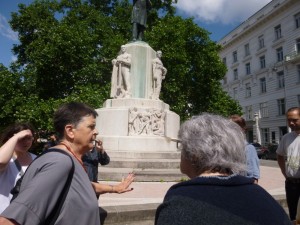Euro Top
[Originally published on the blog of the Quaker Council for European Affairs, qceablog.wordpress.com]
Update 30 August: The European Council meeting has ended with the announcement that Poland’s Donald Tusk has been named the President of the European Council and Italy’s Frederica Mogherini as the new EU High Representative of Foreign Affairs and Security Policy. Frederica Mogherini has been Italy’s national Foreign Affairs minister for just over six months. We might be pleased to see a fresh face, – but Mogherini has a reputation for being overly friendly to Russia. (One profiler interprets this as ‘just following orders’, but this is of even greater concern!)
As a Brookings Institute commentator has recently written :
No one claims that Mogherini is the best person to deal with Russia but asking who is is not seen as a relevant question….Appointing the right person could serve the purpose of rallying the member states, pressuring them to stick to their previous declarations, and being a powerful voice for Europe’s values and its interests in a peaceful and free continent.
The Heads of Government are, as I write, meeting with Poroshenko, the president on Ukraine who yesterday announced a desire to join NATO. The crisis in Ukraine is a real threat to peace in Europe, andone which is escalating. It is the External Action Service -the agency of this the High Representative of Foreign Affairs is the head – which is said to be tasked with providing confirmation to the EU as to changes, such as confirmation of recent claims of increased incursion by Russian troops into eastern Ukraine.
I was a young women working with Russians organising citizen exchanges in the exciting time of Gorbachev and Yeltsin, and I got to know Russian culture very well. (Visits back more than 15 years later were shocking in how little things had changed, since the country had change so very much in form.) Having someone with a naive approach to Russia overseeing EU foreign policy a step in the wrong direction. Conflict and violence are often choices of the last resort: we will be enabled to resolve this issue peacefully with a strong foreign affairs chief who is able to find -and stand firmly for- peace in Europe.
Mogherini and the rest of the Commissioners must be confirmed by the European Parliament – there is still time to write to your MEP and outline the need for a focus on courage, openness, and consensus-building in the new foreign affairs and security policy chief.
**
 Tomorrow, 30 August, there will be a special meeting of the European Council. This is a gathering of Heads of Government of the European Union Member States, a summit. (I rather like the phrase often used in Dutch, as brief and descriptive: ‘Euro Top’.)
Tomorrow, 30 August, there will be a special meeting of the European Council. This is a gathering of Heads of Government of the European Union Member States, a summit. (I rather like the phrase often used in Dutch, as brief and descriptive: ‘Euro Top’.)
One of the main items on the agenda is attempting to make decisions regarding the candidates for the top positions in the European Union, especially the High Representative for Foreign and Security Policy,responsible for all aspects of the EU’s foreign and security policy, and the person who must ensure that the EU’s foreign policy furthers the EU’s commitment to human rights and peace. The same meeting is expected to review the developments in Ukraine, which makes it directly relevant to peace on the European continent.
At the moment, the slate of Commission candidates is made up of nominees by the different Member States. The High Representative position is decided directly by the Council, and the others, after being nominated by their countries and agreed by the European Council, are given a portfolio by the Commission president, Jean-Claude Juncker. Each nominee will then be subject to vetting by the European Parliament – the Parliament has notified Juncker that a Commission without a gender balance will be rejected. And yet the Member States have nominated many more men than women. The Human Rights and Democracy Network (HRDN) of which QCEA is a member, has published a job description for the position of High Representative for Foreign Affairs. QCEA summarises the skills under three headings:
- Consensus building – The new High Representative will need to work with all 28 EU Member States to have an impact. Some EU countries have a strong record of promoting peace, but others argue for military responses to security challenges. Consensus building will also be important to ensure the EU speaks with one voice about Human Rights.
- Openness – The High Representative should be open to engaging with civil society organisations when visiting third countries and also when developing policy. Peaceful societies are those which ensure security for all citizens. It is important for the High Representative to hear about the lives of the world’s most vulnerable people. It is also important for the EU’s External Action Service to be open and transparent to ensure it is a trusted actor in international affairs.
- Courage – Publicly defending human rights and promoting peace can be lonely. It may bring the High Representative into conflict with governments with that the EU relies upon for trade. Within the EU, some Member States are fiercely protective of their arms industries and argue that the production and sale of weapons is important for economic recovery.
What can you do? We will be updating this blog with news as soon as we hear if after 30 August. And it is not too late to send your MEP or head of government an e-mail outlining the need for the High Representative to be someone who can build peace in the EU’s foreign policy!
**
This blog is based in part on work prepared by Andrew Lane, who leads QCEA’s peace programme.
These previous QCEA articles give some more background information:
The European Union Should Prepare for Peace Not War (p3) http://www.qcea.org/wp-content/uploads/2014/04/Around-Europe-356-aprilmaycolourandhyperlinked.pdf
EU Reverts to Militarism http://www.qcea.org/wp-content/uploads/2014/04/Around-Europe-355-febmarchcolouredandhyperlinked2.pdf
EU Parliament Demands EU Drone Project Assess Impact on Human Rightshttps://qceablog.wordpress.com/2014/04/14/european-parliament-demands-eu-drone-projects-assess-their-impact-on-human-rights/
European External Action Service: A first-year scorecard – Room for Improvement.http://www.qcea.org/wp-content/uploads/2012/03/ae-en-339.pdf
Defending Europe: QCEA Briefing Paper produced in advance of the December 2013 European Councilhttp://www.qcea.org/wp-content/uploads/2013/12/EUMil-BP-Final-30Nov.pdf


Leave a Reply